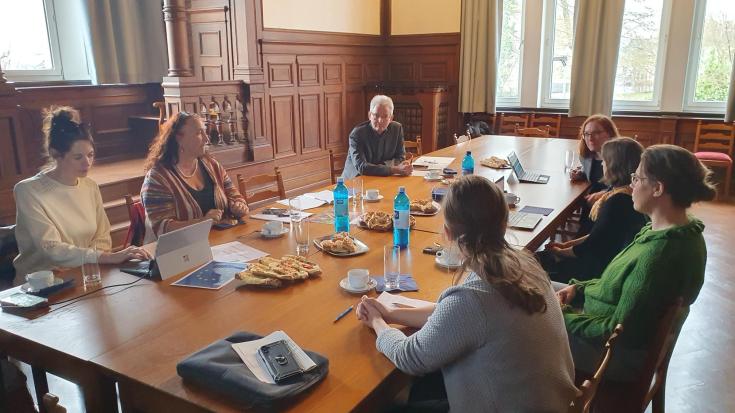2nd regional stakeholder meeting in Hesse (DE)
On the 11th of March, 2025, the second Regional Stakeholder Meeting of the INSPIRE Project (Innovative and Smarter Policy Instruments for Rural Europe) took place in Wetzlar, hosted by the Chamber of Industry and Commerce Lahn-Dill and the Institute for Rural Development Research (IfLS) as well as the LEADER-Region Lahn-Dill-Wetzlar. This gathering brought together key stakeholders, including representatives from regional initiatives and state institutions, to discuss ongoing projects, share insights, and refine strategies to improve rural development policies.
The meeting aimed to explore how various political instruments, including state-supported initiatives, can complement the LEADER Program and how digital and social innovation can help shape the future of rural communities. The focus was primarily on Smart Villages and digital transformation in rural areas.
The first session of the meeting featured a presentation by Ms. Kirstin Rowedder, of the Hessian Ministry of Digitalization and Innovation. She provided valuable insights into Hesse’s commitment to digital transformation in rural areas. Ms. Rowedder discussed several initiatives supported by the state, including Smart Villages and digital tools for rural development. The state is focusing on digital solutions and social innovation to strengthen rural communities and enhance their access to new opportunities.
In the second session, Dr. Ulrich Gehrlein and Mercedes Bindhardt reviewed the activities carried out during the second semester of the INSPIRE project. They highlighted key regional case studies that showcase innovative approaches to rural development:
- Breitscheid Cave and Village Lime: Developed a digital approach to enhance accessibility for non-traditional visitor groups.
- Bus Driving Simulator: Addressed the shortage of skilled workers in public transportation.
- Digital Town Hall in Hüttenberg: An example of digital administration and citizen services.
- Pop-Up Coworking Space: Temporary coworking solutions that align with regional development goals.
- New Fire Station with Integrated Coworking Space: A multifunctional infrastructure concept combining emergency services and workspace.
These initiatives provided concrete examples of how digital innovation can address regional challenges and contribute to economic and social development in rural areas.
As the INSPIRE project moves forward, the third session focused on next steps for improving policy instruments. This included refining the LEADER Program, particularly through the needs of assessments conducted via an online survey and digital idea collection, and the preparation for the upcoming international visit to Spain, offering an opportunity to learn from international counterparts and incorporate new ideas into the project.
Key questions emerged during the meeting regarding how the LEADER Program can fill gaps left by other funding mechanisms. The group discussed how digital approaches and social innovations can be strengthened. Several challenges were identified, including identifying unmet needs, engaging additional stakeholders, and ensuring that regional strategies are adaptable.
The meeting also examined the need for a more localized approach for some challenges, while others require broader, strategic coordination. The discussion highlighted that LEADER’s role may need to evolve, possibly through capacity-building measures or the chance of management.
Several potential areas for policy improvement emerged from the discussions (telemedicine, E-commerce, tourism, lifelong learning, accommodation sector, culture, supporting (digital) communities and social innovation) to guide the adaptation of the Local Development Strategy (LES) and ensuring that the LEADER Program remains relevant and impactful. Some acknowledged that not all needs could be addressed solely at the regional level, while others may require a more localized, bottom-up approach.
The year 2025 will be a crucial year for aligning the strategies with state-level guidelines and refining focus areas of the LEADER program, and by mid to late 2025, further discussions will take place to refine these strategies and implement the lessons learned during the Regional Stakeholder Meetings. The focus will be on strategic implementations, leadership changes, and adapting the program to ensure it supports digital and social innovation effectively.

